

MODALS. Modals. Uses. Abilities. Modal Verbs of Necessity. The modal verbs of necessity show obligations in the past, present, or future.
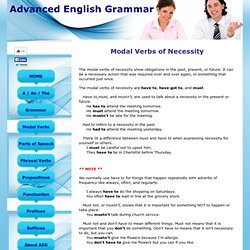
It can be a necessary action that was required over and over again, or something that occurred just once. The modal verbs of necessity are have to, have got to, and must. Have to,must, andmustn't, are used to talk about a necessity in the present or future. He has to attend the meeting tomorrow. He must attend the meeting tomorrow. Had to refers to a necessity in the past. There IS a difference between must and have to when expressing necessity for yourself or others.
We normally use have to for things that happen repeatedly with adverbs of frequency like always, often, and regularly. Modal Verbs of Permission. Use the modal verbs of permission, 'can,' or 'could,' to indicate whether someone has permission to do something or not.
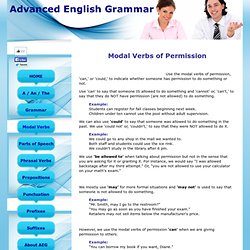
Use 'can' to say that someone IS allowed to do something and 'cannot' or, 'can't,' to say that they do NOT have permission (are not allowed) to do something. Example:Students can register for fall classes beginning next week. Children under ten cannot use the pool without adult supervision. ABILITY & INHABILITY. Modal Verbs of Ability. The modal verbs of ability show just that -- ability.
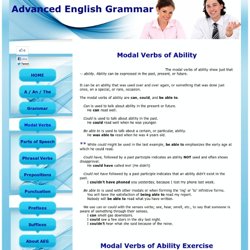
Ability can be expressed in the past, present, or future. It can be an ability that was used over and over again, or something that was done just once, on a special, or rare, occasion. The modal verbs of ability are can, could, and be able to. Can is used to talk about ability in the present or future. He can read well. Could is used to talk about ability in the past. Be able to is used to talk about a certain, or particular, ability. ** While could might be used in the last example, be able to emphasizes the early age at which he could read. Could have, followed by a past participle indicates an ability NOT used and often shows disapproval. Could not have followed by a past participle indicates that an ability didn't exist in the past.
Modal Verbs of Probability. Modal Verbs of Obligation. Click here for all the exercises about modal verbs We can use have to + infinitive, must + infinitive and should + infinitive to express obligation (something you have to do).
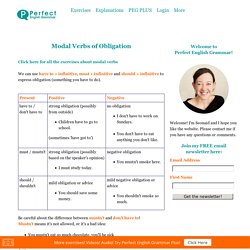
Be careful about the difference between mustn't and don't have to! Mustn't means it's not allowed, or it's a bad idea: You mustn't eat so much chocolate, you'll be sickDon't have to means you don't need to do something, but it's fine if you want to do it: I don't have to get up early at the weekend(of course, if I want to get up early, that's fine, but I can stay in bed if I want). * Remember 'must have done' is a modal verb of deduction or speculation, not obligation in the past. Have To and Have Got To - Grammar Reference and Practice Exercise. Verbos Modales en Inglés - Must. If you can't see the Babylon translation box, use this link for <a href=" or this one for <a href=" Descárgalo gratis aquí El verbo 'must' expresa una prohibición u obligación fuerte así como cierta certeza: I must go.

She must be crazy. En español significa debo, debo de. I must - debo / debo de Affirmative <object type="application/x-shockwave-flash" data="/audio/mediaplayer.swf" width="100" height="20"><param name="movie" value="/audio/mediaplayer.swf" /><param name="flashvars" value="file=/audio/resources/main-verbs/must.01.mp3" /></object> I must go to the library. Negative. Modal Verbs of Obligation Exercise 1. Review modal verbs of obligation hereDownload this quiz in PDF hereSee all modal verbs exercises here Need more exercises?
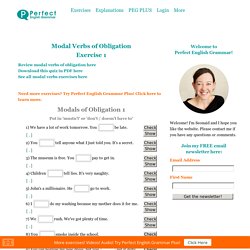
Try Perfect English Grammar Plus! Should and Shouldn't. When to Use. How to Use. Modal Verbs. Grammar Reference and Interactive Practice Exercises.